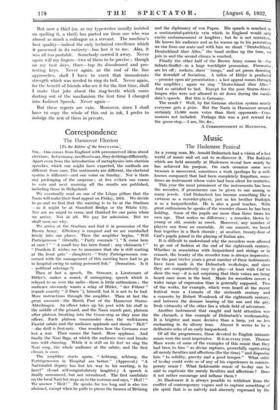Correspondence
The Hannover Election
[To the Editor of the SPECTATOR.; SIR,—Une conies from England with preconceived ideas about elections. In Germany, needless to say, they do things differently. Apart even from the introduction of metaphysics into election speeches, which one might have expected, the methods are different from ours. The sentiments are different, the electoral system is different—and one votes on Sunday. Nor is there any prolonging of the suspense ; at five o'clock one ceases to vote and next morning all the results are published, including those in Heligoland.
We eventually read on one of the Litgas pillars that the Nazis will make their final appeal on Friday, 29th. We decide to go and we find that the meeting is to be at the Stadium —as it might be at Stamford Bridge or the White City. Nor are we urged to come, and thanked for our pains when we arrive. Not at all. We pay for admission. But we shall soon see why.
We arrive at the Stadium and find it in possession of the Brown Army. Efficiency is rampant and we are marshalled firmly into our places. Then the amplifier begins, "Will Parteigenosse " (literally, "Party comrade ") "X come here at once ? " "A small boy has been found : any claimants ? " " Fraiilein Z. wishes me to announce that she is still waiting at the front gate "—(laughter)—" Sixty Parteigenossen con- cerned with the management of this meeting have had to go to hospital owing to eating poisoned fish." (Sensation. Is it —political sabotage ?)
Then at last a speech. Dr. Strasser, a Lieutenant of Hitler's, makes a sound, if uninspiring, speech which is relayed to us over the radio—there is little enthusiasm ; the audience obviously wants a relay of Hitler, "der Fiihrer " (equals exactly "ii Duce "), himself, but it is not to be had. More instructions through the amplifier. Then at last the great moment—the March Past of the Hannover Sturm- Abteilungen. An officer takes up his post with his staff in the middle of the ground, and the Nazis march past, platoon after platoon breaking into the Goose-step as they near the officer. Each platoon commander does the well-known Fascist salute and the audience applauds and shouts " Heil " —the drill is first-rate. One wonders how the Germans ever lost a war. Then comes the band. More applause. And finally the Nazi flags, at which the audience rises and breaks into wild cheering. While it is still on its feet we sing the Nazi song, the whole audience at the salute, and the first climax is over.
The amplifier starts again, " Achtung, achtung, the Par teigenossen in Hospital are better." (Approval.) "A Nationalist deputy has lost his way to his meeting, is he here?" (Loud self-congratulatory laughter.) A speech is finally announced, but not introduced. The first candidate on the local Nazi list steps on to the rostrum and says, " Heil I" We answer "Hell !" He speaks far too long and is also too abstract, except when he pulls to pieces the finance of Bruning and the diplomacy of von Papen. His speech is couched in a sentimental-patriotic vein which in England would only excite embarrassment or laughter ; but he is not mistaken. He knows his audience and as he warms up to his peroration we rise from our seats-and with him we shout "Deutschland, Deutschland iiber Alles," the band strikes up the tune, we join in and the second climax is reached.
Finally the other half of the Brown Army comes in—the Schutz-Staffel—in a huge torchlight procession. Fireworks, are let off ; rockets, sheer "bangs," and set pieces denoting the downfall of Socialism. A talkie of Hitler is produced —premier open air presentation ; a last appeal comes through the amplifier ; again we sing "Deutschland fiber Alles." And so satisfied to bed. Except for the poor Sturm-Abtei- lungen who were not allowed to sit down during the candi- date's speech. But this is Germany.
The result ? Well, by the German election system nearly everyone gets a prize. But the Nazis in Hannover secured certainly 15,000 more votes than their opponents—Com- munists not included. Perhaps this was a just reward for the goose-step.—I am, Sir, &c.,
A CORRESPONDENT IN HANNOVER.


























 Previous page
Previous page